7 Habits of Highly Effective
The 7 Habits of Highly Effective People

﹡受成长历程,社会环境及个人观念的影响。
15 / GE /
思维模式转换
Paradigm Shift
如果我们想要有重大的改变,我们必须先改变 我们的思维方式。 《科学革命的构架》(The Structure of Scientific Revolutions)一书的作者汤姆斯.肯 指出:每一项科学研究的重大突破几乎都是先 打破传统打破旧观念,然后取得成功的。
我们的家庭使命
创造一个充满爱与和谐轻松愉快修 身养性的氛围。 提供每一个家庭成员既独立承担责 任又互相依赖的机会,从而使人生 更有意义。
36 / GE /
我的信条
我视每一日为新的开始,因此我有更多机会书写人生新的篇章。我从宝贵 的生活经历中学习得到成长。我把握每一个机会, 不畏艰难,不怕失败。勇于承担责任。
在信任之上的。
• 信任只给值得被信任 的人
个人 可信度
11 / GE /
品格与能力
Character and Competence
品格:品格良好的人具有正直、 成熟以及富足的心态。 能力:能力强的人具有专业知识 与技能。
信任度 Trustworthines s
信任
Trust
品格
Character
能力
习惯 持续成熟模式 原则 思维 产能/产出平衡效能的原则
习惯的培养
知识是做什么以及为何去做; 技能是如何去做; 意愿是想要去做。
习惯 技巧 ( 如何做 ) 意愿 ( 想做 ) 知识 ( 做什么, 为何做 )
要养成良好的习惯,我们必须具备以上三点。
6/ GE /
习惯的特点
• 长期形成
• 自然流畅 • 不思而为
我是个负责的丈夫(妻子)和父(母)亲,我很重视这两个角色。我努力 同家人朋友商业伙伴建立良好的双赢关系。我每日在他人的情感帐户内存 款,以保持良好人际关系并建立高度信任。
高效能人士的7个习惯

Interdependence is the paradigm of we, we can do it, we can cooperate, we can combine our talents and abilities and create something greater together.—Achieve success by group efforts.
习惯一:积极主动
Habit 1: Be Proactive
Our basic nature is to act, and not to be acted upon. As well as enabling us to choose our response to particular circumstances, this empowers us to create circumstances.
习惯一 积极主动
Habit 1: Be Proactive
• 积极主动的人有责任感,不把自己的行为归咎于环境或者他 人.
Highly proactive people recognize their responsibility. They do not blame circumstance, conditions, or other people.
The 7 habits paradigm
三个不同的期间
The Maturity Continuum
• 依赖期:围绕“你”这个观念,你照顾我,你为我的成败得失负责; 事情若有差错,我便怪罪于你。--靠别人来完成自己的愿望。
Dependence: Paradigm of you, you take care of me; you come through for me; you did not come through, I blame you for the results.—Depend on others to achieve wishes.
The 7 Habits of Highly Effective People精品文档19页
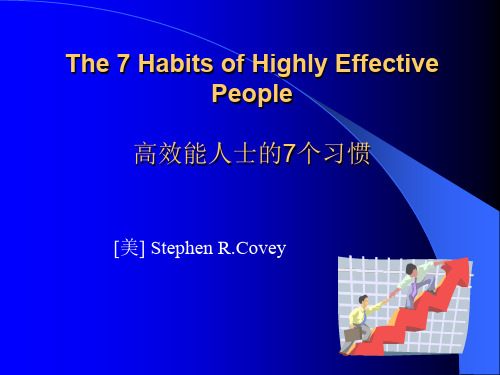
习惯5: 知彼解己(Seek First To Understand, Then To Be Understood)
同理心倾听 站在对方的角度 有效的沟通 适时扮演知音 表达也要讲技巧
主动积极
采取主动:不要找借口 化消极为积极 不要说“我办不到” 行动胜过“感觉” 别让问题制服了你 用心扩大影响圈 先从自己做起 不怕犯错,只怕不改过 作出承诺,信守诺言
习惯2: 以终为始 (Begin With The End In Mind)
确认使命:着手做任何一件事前,先认清方向.
习惯3: 要事第一(Put First Things First)
轻重缓急体系 别让琐务牵着鼻子走 勇于说“不” 有效授权
个人管理方法六标准
一致:理想与使命,角色与目标,工作重点与计 划,欲望与自制
平衡:健康,家庭,个人发展等的平衡 有重心:做第二象限的事情 重人性:考虑人际关系的得失 能变通:可调整 携带方便:随时可供参考修正
互赖期:从“我们”的观念出发—我们可以自主, 合作,共创前程.
效能(Effectiveness)
产出与产能必须平衡(P/PCBalance) 产出:是你希望获得的结果 产能:是你借以达到目标的资产或本领
习惯1:主动积极(Be Proactive)
采取主动 人必须为自己负责 个人行为取决于自身,而非外在环境 理智可以战胜感情
习惯6: 统和综效(Synergize)
敞开胸怀,博采众长 开辟变通方案 尊重差异 化阻力为助力 重视个人参与
沟通的层次
自我防卫:损人己或损己利人 彼此尊重:妥协 统合综效:利人利己
高效能人士的七个习惯

– 技能
• 如何去做
– 意愿
• 意愿是想要去做
技能
意愿
• 养成习惯
– 若要在生活中养成习惯,以 上三种缺一不可
(怎么做)
(想要去做)
10
THE 7 HABITS OF HIGHLY EFFECTIVE PEOPLE
思维引发行为; 行为渐成习惯; 习惯塑造品格; 品格决定命运。
习惯的养成
知识 Knowledge
习惯的意义
人的行为总是一再重复,因此卓越 不是单一的举动,而是习惯。 ——亚里斯多德
13
THE 7 HABITS OF HIGHLY EFFECTIVE PEOPLE
持续成熟的模式 -- 成熟的三个阶段
• 依赖期:围绕着“你”这个观念。 ——你照顾我;你为我的成败得 失负责;事情若有差错, 我便怪 罪于你。 • 独立期:着眼于“我”的观念。 ——我可以自立;我为自己负责; 我可以自由选择。 • 互赖期:从“我们” 的观念出发。 ——我们可以自主、合作、统合 综效, 共创伟大前程。
• 需要工作→被工作需要
26
THE 7 HABITS OF HIGHLY EFFECTIVE PEOPLE
情感帐户EBA • Emotional Bank Account
• 情感帐户是比喻情感关系中的信任程度, 因为人与人的每一次交往都可以被看作是
存款或提款。
• 存款能建立、维护或加强关系中的信任
思维转换
• 建立全新的观点
• 我们每个人都守着一扇自内开启的“改变之门” • 除了自己,没有人能为你开门 • 只要你愿意敞开心灵 • 抛却原有思维 • 把良好的原则化为习惯 • 成功的圆满就在掌握之中
22
THE 7 HABITS OF HIGHLY EFFECTIVE PEOPLE
7_Habits_of_Highly_Effective_People_高效人士的7个习惯
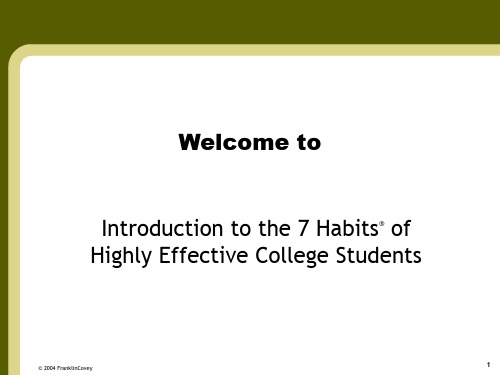
© 2004 FranklinCovey
5
Habit 1: See-Do-Get
I am responsible for my choices.
See
I am in control.
Get
© 2004 FranklinCovey
Do
I choose to act,
not react.
6
Key Questions
• Go on a date with a friend.
• Work on an essay due in 30 days.
• Call home.
• Visit with academic advisor.
• Engage in idle conversations.
• Respond to all instant messages.
Welcome to
Introduction to the 7 Habits® of Highly Effective College Students
© 2004 FranklinCovey
1
Knowledge, Skill, Desire
© 2004 FranklinCovey
2
See-Do-Get See
• Respond to all phone calls.
• Spend time on trivial questions.
• Engage in too much TV, Web surfing or video games.
• Engage in timewasters.
• Become absorbed in escape activities.
高效能人士的七个习惯(英文)
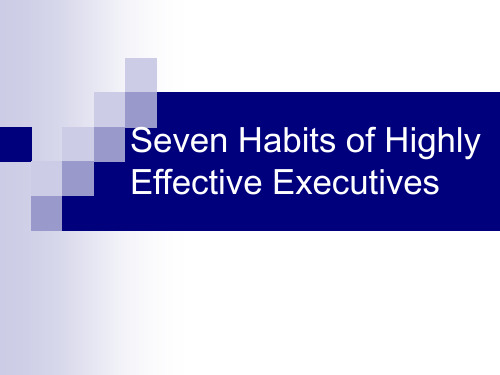
Work
Be an “actor” not a “reactor” Focus on your circle of control
Begin with the End in Mind
Self
All things are created twice, first in our mind then in actuality
Synergize
The whole is greater than the sum of the parts
Value the differences Share the goals, share the wealth Look for ways to partner
Sharpen the Saw
You can create your own self first in your mind, then with a plan in actuality
Develop your own personal mission statement
Work
Decide where you need to be first, then put together the action plan
Don’t be too busy sawing that you can never sharpen the saw
Take time for self-renewal
Physical self-renewal Spiritual self-renewal Mental/Intellectual self-renewal Social/emotional self-renewal
Seven Habits of Highly Effective Executives
7_Habits_of_Highly_Effective_People_高效人士的7个习惯
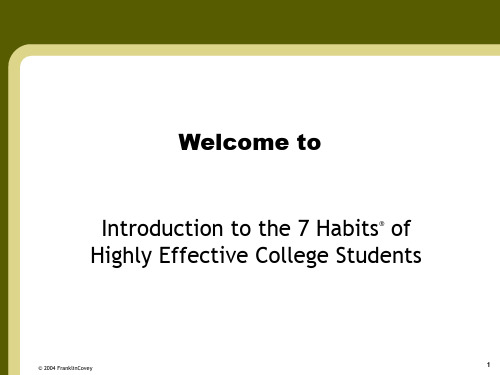
▪ Desire success for others.
▪ Have a strong self-image.
▪ Enjoy the rewards of hard work.
▪ Make sure their words and actions show respect
for all team members.
13
Habit 2
© 2004 FranklinCovey
Habit 2
Begin With the End in Mind®
14
Habit 2: See-Do-Get
I visualize results.
See
I live according to my Get mission.
© 2004 FranklinCovey
• Respond to all phone calls.
• Spend time on trivial questions.
• Engage in too much TV, Web surfing or video games.
• Engage in timewasters.
• Become absorbed in escape activities.
18
Habit 3: See-Do-Get
I focus on what’s
See
important.
I achieve my goals.
Get
© 2004 FranklinCovey
Do
I plan my time according to my priorities.
19
Life Management Quadrants
高效能人士的七个习惯
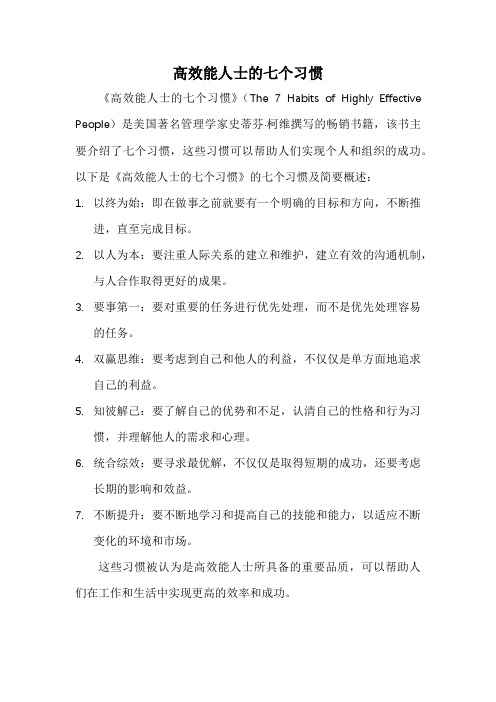
高效能人士的七个习惯
《高效能人士的七个习惯》(The 7 Habits of Highly Effective People)是美国著名管理学家史蒂芬·柯维撰写的畅销书籍,该书主要介绍了七个习惯,这些习惯可以帮助人们实现个人和组织的成功。
以下是《高效能人士的七个习惯》的七个习惯及简要概述:
1.以终为始:即在做事之前就要有一个明确的目标和方向,不断推
进,直至完成目标。
2.以人为本:要注重人际关系的建立和维护,建立有效的沟通机制,
与人合作取得更好的成果。
3.要事第一:要对重要的任务进行优先处理,而不是优先处理容易
的任务。
4.双赢思维:要考虑到自己和他人的利益,不仅仅是单方面地追求
自己的利益。
5.知彼解己:要了解自己的优势和不足,认清自己的性格和行为习
惯,并理解他人的需求和心理。
6.统合综效:要寻求最优解,不仅仅是取得短期的成功,还要考虑
长期的影响和效益。
7.不断提升:要不断地学习和提高自己的技能和能力,以适应不断
变化的环境和市场。
这些习惯被认为是高效能人士所具备的重要品质,可以帮助人们在工作和生活中实现更高的效率和成功。
The 7 Habits of Highly Effective People(成功人士的七个习惯)

Be Proactive 积极主动 Begin with the End in Mind 以终为始 Put First Things First 要事第一 Think Win/Win 双赢思维 Seek First to Understand, Then to be Understood 知彼解己 Synergize 统合综效 Sharpen the Saw 不断更新
2
Habit 习惯
• Habit is the intersection of knowledge, skill and desire. 习惯是知识,技能和欲望的混合体.
• Knowledge is understanding what to do and why to do it. 知识是懂得该做什么和为何要做.
• An activity is important if we find it valuable and it contributes to our mission, values and goals. 一件重要的任务是视为有价值的和对我们的使命,价 值观和目标有贡献的.
16
Habit 3 - Put First Things First 要事第一
双赢思维是把生活看作是一个合作的舞台,达到利人利己的结果.
• Characteristics of win-win are:
双赢思维的个性:
– Seeks mutual benefit.
争取利人利己(寻求互惠互利).
– Is cooperative, not competitive.
是合作性,非竞争性.
• Studies have shown that only 7% of our communication is by words we say, another 38% by our sounds and how we say words, and 55% by our nonverbal and body. 研究证明,人与人之间的沟通,7% 是通过所说的文字,38% 是通过声音和语气,55% 是通过肢体语言.
高效能人士的七个习惯The 7 Habits of Highly Effective People讲解

全面观照生命 习惯七:不断更新 ——平衡的自我更新的原则
人生最值得的投资就是磨练自己,因为生 活与服务人群都得靠自己,着是最珍贵的工 具。 工作本身并不能带来经济上的安全感,具 备良好的思考、学习、创造与适应能力,才 能立于不败之地。拥有财富,并不代表经济 独立,拥有创造财富的能力才真正可靠。
与我们所爱的人、朋友,我们 的同事和谐一致,或曰统一, 是七个习惯最高的、最美好的 成果。
个人的成功:从依赖到独立 习惯三:要事第一 ——自我管理的原则
重要之事绝不可受芝麻绿豆小事的牵绊。 ——歌德(Goethe)德国诗人
有效的个人管理方法六标准: 1.一致 2.平衡 3.有重心 4.重人性 5.能变通 6.携带方便
公众的成功:从独立到互赖 情感帐户存款(Emotional Bank Account)
人际关系六种模式 利人利己(赢/赢) 损人利己(赢/输) 损己利人(输/赢) 两败俱伤(输/输) 独善其身(赢) 好聚好散(无交易)
公众的成功:从独立到互赖 习惯五:知彼解己 最重要的原则,那就是:知 彼解己——首先寻求去了解对方,然后 再争取让对方了解。这一原则是进行有 效人机交流的关键。
积极主动 试试看有没有其它可能性 我可以选择不同的作风 我可以控制自己的情绪 我可以想出有效的表达方式 我能选择适当的回应 我选择 我情愿 我打算……
个人的成功:从依赖到独立
习惯二:以终为始 ——自我领导的原则
太多人成功之后, 反而感到空虚;得到 名利之后,却发现牺 牲了更可贵的事物。 因此,我们务必掌握 真正重要的愿景,使 生活充满意义。
You are not alone! 你不是一座孤岛! 所谓感情帐户,储存的是增进人际关系不可或 缺的“信赖”,也就是他人与你相处时的一分 “安 全感”。 存入六种感情存款: 理解别人 注意小节 信守承诺 阐明期望 诚恳正直 勇于道歉
高效能人士的七个习惯

高效能人士的七个习惯/阅读培训Seven habits of highly effective people / reading report培训人:****E F F C I E N C Y高效能人士的七大习惯高效能人士的七个习惯《高效能人士的七个习惯》由著名领导力大师、人际关系专家史蒂芬·柯维博士开发的享誉全球的课程,是优秀的管理类书籍。
史蒂芬·柯维 著名的管理学大师; 被誉为“思想巨匠”; “人类潜能的导师”。
本书简介高效能人士的七个习惯人类普遍面临的挑战?1 234恐惧感和不安感;我现在就想得到谴责和抱怨;绝望无助;缺乏人生平衡;我的定位在哪里渴望理解;冲突和分歧个人的停滞不前高效能人士的七个习惯如何改变现状?1 积极主动2 以始为终;3 要事第一;4 双赢思维5 知彼解己6 统合综效;7 不断更新$习惯的定义高效能人士的七个习惯1知识是理论范畴,指点“做什么”以及“为何做”;2技巧告诉“为何做”;3意愿促使“想要做”。
七个习惯概述高效能人士的七个习惯讲的是如何自我约束,由依赖进步到独立。
属于“个人领域”的成功范畴,是培养品德的基础。
讲的是团结、合作与沟通,属于“公共领域”的成功。
涵盖了其他六个习惯,讲的是自我更新,如何实现自我平衡而有规律的自我更新。
面临的问题及解决方法高效能人士的七个习惯Array1.可直接控制的问题:习惯一二三。
2.可间接控制的问题:习惯四五六。
3.无法控制的问题:接受现实。
由内而外全面造就自己高效能人士的七个习惯Array要改变现状,解决人生的苦恼和困惑,需要我们改变自己。
改变自己的第一步即是改变自己对问题的看法。
自动自发因素的作用多于外界的因素,所以自己对问题的看法在实现成功人生有着极为重要的作用。
人类的本质比言行更具有说服力。
品德的作用居于成功因素的首位,个人魅力也并非不重要,但是只居于次要地位。
习惯一:积极主动——个人愿景的原则高效能人士的七个习惯自我意识、想象力、良知、独立意志是人类的四大天赋,也是职场人士天然具备的重要资源。
高效能人士的七个习惯_史蒂芬. R. 柯维博士
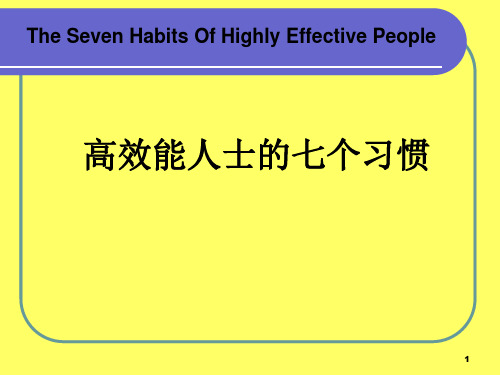
效率是产出和产能的平衡
产出(Production)是指生产出来的结果
产能(Production Capability)是指生产以及进一 步生产的能力和资源
中国成语中的产出和产能
杀鸡取卵 ...?
产出
产能
8
信任乃是情感的帐户
人际关系里信任程度的深刻暗喻!这是说,你与他人的一
切联系都可以被想像为在个人的信任帐户中存款或者取款:
你在关系里投入、建立、修缮并维护,就是存入情感(信任):和
蔼可亲,严守诺言,尊重、忠诚、道歉等等;
反之,你就是提取情感(信任):态度恶劣、破坏期望、八面玲
珑、骄傲、不合作等等。
9
故事I:习惯何其重要!
父子两住山上,每天都要赶牛车下山卖柴。老父较 有经验,坐镇驾车,山路崎岖,弯道特多,儿子眼神较 好,总是在要转弯时提醒道:“爹,转弯啦!”
价值观-我们赋予人、事物、观点或原则的价值或优先级
自我选择的信仰和观点 内部的、主观的,基于我们如何看待世界 受教养、社会和个人反映的影响
我们控制我们的行动,原则控制这些行动的后果
你能选择自己的行为,但你不能选择这些行为的结果 这些结果由自然法则和原则控制
5
习惯的三要素
习惯是知识、技能和意愿的交集
15
故事II: 主动积极——你是你选择
有三个人要被关进监狱三年,监狱长给他们三个一人一个要 求。
美国人爱抽雪茄,要了三箱雪茄。 法国人最浪漫,要一个美丽的女子相伴。 而犹太人说,他要一部与外界沟通的电话。 三年过后,第一个冲出来的是美国人,嘴里鼻孔里塞满了雪 茄,大喊道:“给我火,给我火!”原来他忘了要火了。 接着出来的是法国人。只见他手里抱着一个小孩子,美丽女 子手里牵着一个小孩子,肚子里还怀着第三个。 最后出来的是犹太人,他紧紧握住监狱长的手说:“这三年 来我每天与外界联系,我的生意不但没有停顿,反而增长了200%, 为了表示感谢,我送你一辆劳施莱斯!” 这个故事告诉我们,什么样的选择决定什么样的生活。今天 的生活是由三年前我们的选择决定的,而今天我们的抉择将决定我 们三年后的生活。我们要选择接触最新的信息,了解最新的趋势, 从而更好的创造自己的将来。
高效率人的七个习惯英语材料

THE 7 HABITS OF HIGHLY EFFECTIVE PEOPLEBy Stephen CoveyYour life doesn't just "happen." Whether you know it or not, it is carefully designed by you. The choices, after all, are yours. You choose happiness. You choose sadness. You choose decisiveness. You choose ambivalence. You choose success. You choose failure. You choose courage. You choose fear. Just remember that every moment, every situation, provides a new choice. And in doing so, it gives you a perfect opportunity to do things differently to produce more positive results.HABIT 1 : BE PROACTIVEHabit 1: Be Proactive is about taking responsibility for your life. You can't keep blaming everything on your parents or grandparents. Proactive people recognize that they are "response-able." They don't blame genetics, circumstances, conditions, or conditioning for their behavior. They know they choose their behavior. Reactive people, on the other hand, are often affected by their physical environment. They find external sources to blame for their behavior. If the weather is good, they feel good. If it isn't, it affects their attitude and performance, and they blame the weather. All of these external forces act as stimuli that we respond to. Between the stimulus and the response is your greatest power--you have the freedom to choose your response. One of the most important things you choose is what you say. Your language is a good indicator of how you see yourself. A proactive person uses proactive language--I can, I will, I prefer, etc. A reactive person uses reactive language--I can't, I have to, if only. Reactive people believe they are not responsible for what they say and do--they have no choice.Instead of reacting to or worrying about conditions over which they have little or no control, proactive people focus their time and energy on things they can control. The problems, challenges, and opportunities we face fall into two areas--Circle of Concern and Circle of Influence.Proactive people focus their efforts on their Circle of Influence. They work on the things they can do something about: health, children, problems at work. Reactive people focus their efforts in the Circle of Concern--things over which they have little or no control: the national debt, terrorism, the weather. Gaining an awareness of the areas in which we expend our energies in is a giant step in becoming proactive.HABIT 2: BEGIN WITH THE END IN MINDSo, what do you want to be when you grow up? That question may appear a little trite, but think about it for a moment. Are you--right now--who you want to be, what you dreamedyou'd be, doing what you always wanted to do? Be honest. Sometimes people find themselves achieving victories that are empty--successes that have come at the expense of things that were far more valuable to them. If your ladder is not leaning against the right wall, every step you take gets you to the wrong place faster.Habit 2 is based on imagination--the ability to envision in your mind what you cannot at present see with your eyes. It is based on the principle that all things are created twice. There is a mental (first) creation, and a physical (second) creation. The physical creation follows the mental, just as a building follows a blueprint. If you don't make a conscious effort to visualize who you are and what you want in life, then you empower other people and circumstances to shape you and your life by default. It's about connecting again with your own uniqueness and then defining the personal, moral, and ethical guidelines within which you can most happily express and fulfill yourself. Begin with the End in Mind means to begin each day, task, or project with a clear vision of your desired direction and destination, and then continue by flexing your proactive muscles to make things happen.One of the best ways to incorporate Habit 2 into your life is to develop a Personal Mission Statement. It focuses on what you want to be and do. It is your plan for success. It reaffirms who you are, puts your goals in focus, and moves your ideas into the real world. Your mission statement makes you the leader of your own life. You create your own destiny and secure the future you envision.HABIT THREE: PUT FIRST THING FIRSTTo live a more balanced existence, you have to recognize that not doing everything that comes along is okay. There's no need to overextend yourself. All it takes is realizing that it's all right to say no when necessary and then focus on your highest priorities.Habit 1 says, "You're in charge. You're the creator." Being proactive is about choice. Habit 2 is the first, or mental, creation. Beginning with the End in Mind is about vision. Habit 3 is the second creation, the physical creation. This habit is where Habits 1 and 2 come together. It happens day in and day out, moment-by-moment. It deals with many of the questions addressed in the field of time management. But that's not all it's about. Habit 3 is about life management as well--your purpose, values, roles, and priorities. What are "first things?" First things are those things you, personally, find of most worth. If you put first things first, you are organizing and managing time and events according to the personal priorities you established in Habit 2.All tasks are evaluated using the criteria important/unimportant and urgent/not urgent and put in according quadrants. Tasks in unimportant/not urgent are dropped, tasks in important/urgent are done immediately and personally, tasks in unimportant/urgent are delegated (委托)and tasks in important/not urgent get an end date and are done personally. Think Win-Win isn't about being nice, nor is it a quick-fix technique. It is a character-based code for human interaction and collaboration.HABITS FOUR: THINK WIN-WINMost of us learn to base our self-worth on comparisons and competition. We think about succeeding in terms of someone else failing--that is, if I win, you lose; or if you win, I lose. Life becomes a zero-sum game. There is only so much pie to go around, and if you get a big piece, there is less for me; it's not fair, and I'm going to make sure you don't get anymore. We all play the game, but how much fun is it really?Win-win sees life as a cooperative arena, not a competitive one. Win-win is a frame of mind and heart that constantly seeks mutual benefit in all human interactions. Win-win means agreements or solutions are mutually beneficial and satisfying. We both get to eat the pie, and it tastes pretty darn good!A person or organization that approaches conflicts with a win-win attitude possesses three vital character traits:1.Integrity: sticking with your true feelings, values, and commitments2.Maturity: expressing your ideas and feelings with courage and consideration for theideas and feelings of others3.Abundance Mentality: believing there is plenty for everyoneMany people think in terms of either/or: either you're nice or you're tough. Win-win requires that you be both. It is a balancing act between courage and consideration. To go for win-win, you not only have to be empathic, but you also have to be confident. You not only have to be considerate and sensitive, you also have to be brave. To do that--to achieve that balance between courage and consideration--is the essence of real maturity and is fundamental to win-win.HABIT 5: SEEK FIRST TO UNDERSTAND, THEN TO BE UNDERSTOODCommunication is the most important skill in life. You spend years learning how to read and write, and years learning how to speak. But what about listening? What training have you had that enables you to listen so you really, deeply understand another human being? Probably none, right?If you're like most people, you probably seek first to be understood; you want to get your point across. And in doing so, you may ignore the other person completely, pretend that you're listening, selectively hear only certain parts of the conversation or attentively focus on only the words being said, but miss the meaning entirely. So why does this happen? Because most people listen with the intent to reply, not to understand. You listen to yourself as you prepare in your mind what you are going to say, the questions you are going to ask, etc. You filter everything you hear through your life experiences, your frame of reference. You check what you hear against your autobiography and see how it measures up. And consequently, you decide prematurely what the other person means before he/she finishes communicating. Do any of the following sound familiar?"Oh, I know just how you feel. I felt the same way." "I had that same thing happen to me." "Let me tell you what I did in a similar situation."Because you so often listen autobiographically, you tend to respond in one of four ways: Evaluating:You judge and then either agree or disagree.Probing:You ask questions from your own frame of reference.Advising:You give counsel, advice, and solutions to problems.Interpreting:You analyze others' motives and behaviors based on your own experiences.You might be saying, "Hey, now wait a minute. I'm just trying to relate to the person by drawing on my own experiences. Is that so bad?" In some situations, autobiographical responses may be appropriate, such as when another person specifically asks for help from your point of view or when there is already a very high level of trust in the relationship.HABIT 6: SYNERGIZETo put it simply, synergy means "two heads are better than one." Synergize is the habit of creative cooperation. It is teamwork, open-mindedness, and the adventure of finding new solutions to old problems. But it doesn't just happen on its own. It's a process, and through that process, people bring all their personal experience and expertise to the table. Together, they can produce far better results that they could individually. Synergy lets us discover jointly things we are much less likely to discover by ourselves. It is the idea that the whole is greater than the sum of the parts. One plus one equals three, or six, or sixty--you name it.When people begin to interact together genuinely, and they're open to each other's influence, they begin to gain new insight. The capability of inventing new approaches is increased exponentially because of differences.Valuing differences is what really drives synergy. Do you truly value the mental, emotional, and psychological differences among people? Or do you wish everyone would just agree with you so you could all get along? Many people mistake uniformity for unity; sameness for oneness. One word--boring! Differences should be seen as strengths, not weaknesses. They add zest to life.HABIT 7: SHARPEN THE SAWSharpen the Saw means preserving and enhancing the greatest asset you have--you. It means having a balanced program for self-renewal in the four areas of your life: physical, social/emotional, mental, and spiritual. Here are some examples of activities:Physical:Beneficial eating, exercising, and restingSocial/Emotional:Making social and meaningful connections with othersMental:Learning, reading, writing, and teachingSpiritual:Spending time in nature, expanding spiritualself through meditation, music, art, prayer, orserviceAs you renew yourself in each of the four areas, you create growth and change in your life. Sharpen the Saw keeps you fresh so you can continue to practice the other six habits. You increase your capacity to produce and handle the challenges around you. Without this renewal, the body becomes weak, the mind mechanical, the emotions raw, the spirit insensitive, and the person selfish. Not a pretty picture, is it?Feeling good doesn't just happen. Living a life in balance means taking the necessary time to renew yourself. It's all up to you. You can renew yourself through relaxation. Or you can totally burn yourself out by overdoing everything. You can pamper yourself mentally and spiritually. Or you can go through life oblivious to your well-being. You can experience vibrant energy. Or you can procrastinate and miss out on the benefits of good health and exercise. You can revitalize yourself and face a new day in peace and harmony. Or you can wake up in the morning full of apathy because your get-up-and-go has got-up-and-gone. Just remember that every day provides a new opportunity for renewal--a new opportunity to recharge yourself instead of hitting the wall. All it takes is the desire, knowledge, and skill.。
七定管理法

4. 双赢思维(Think Win-Win):双赢思维是指寻求合作和共赢的方式,追求双方都能 得到利益的结果。它强调个人的合作和协调能力。
七定管理法
7. 不断更新(Sharpen the Saw):不断更新是指持续学习和自我提升,以保持身心的健康 和活力。它强调个人的自我成长和发展。
七定管理法提供了一套全面的个人管理和领导力原则,帮助人们建立积极、高效的生活方式 。通过实践这些习惯,人们可以提升自己的效率和能力,更好地应对工作和生活中的挑战。
5. 知彼解己(Seek First to Understand, Then to be Understood):知彼解己是指先理 解他人的观点和需求,然后才能被他人理解。它强调个人的沟通和倾听能力。
6. 综合综效(Synergize):综合综效是指通过合作和协同创造出更大的价值和效果。它强 调个人的团队合作和创造力。
1. 积极主动(Be Proactive):积极主动是指主动承担责任,主动寻求解决问题的方式。 它强调个人的自主性和主动性,认为每个人都有能力选择自己的反应和行为。
七定管理法
2. 以终为始(Begin with the End in Mind):以终为始是指明确自己的目标和价值观, 然后根据这些目标和价值观来制定计划和行动。它强调个人的远见和规划能力。
七Hale Waihona Puke 管理法七定管理法(Seven Habits of Highly Effective People)是由美国作家史蒂芬·柯维( Stephen Covey)提出的一种管理和自我完善的方法论。这个方法论主要强调个人的领导力 和自我管理,旨在帮助人们建立健康、积极和高效的生活习惯。
china daily双语新闻7 habits of highly ineffective people
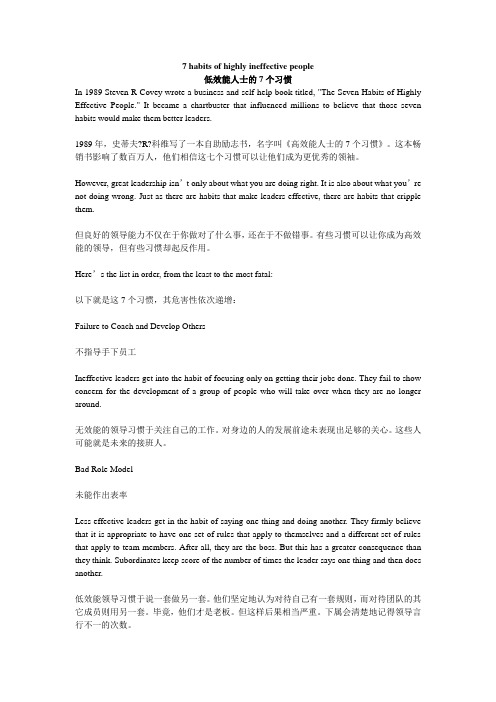
7 habits of highly ineffective people低效能人士的7个习惯In 1989 Steven R Covey wrote a business and self-help book titled, "The Seven Habits of Highly Effective People." It became a chartbuster that influenced millions to believe that those seven habits would make them better leaders.1989年,史蒂夫?R?科维写了一本自助励志书,名字叫《高效能人士的7个习惯》。
这本畅销书影响了数百万人,他们相信这七个习惯可以让他们成为更优秀的领袖。
However, great leadership isn’t only about what you are doing right. It is also about what you’re not doing wrong. Just as there are habits that make leaders effective, there are habits that cripple them.但良好的领导能力不仅在于你做对了什么事,还在于不做错事。
有些习惯可以让你成为高效能的领导,但有些习惯却起反作用。
Here’s the list in order, from the least to the most fatal:以下就是这7个习惯,其危害性依次递增:Failure to Coach and Develop Others不指导手下员工Ineffective leaders get into the habit of focusing only on getting their jobs done. They fail to show concern for the development of a group of people who will take over when they are no longer around.无效能的领导习惯于关注自己的工作。
7_Habits_of_Highly_Effective_People

习惯七:不断更新——自我成长的原则
不断更新就是如何在四个基本生活面向(生理、 社会情感、心智及心灵)中,不断更新自己、 提升自己。这个习惯提升了其它六个习惯的 实施效率。对组织而言,习惯七提供了战略、 流程及运营平台的持续改善,使组织不至呈 现老化及疲态,并迈向新的成长之路。对家 庭而言,习惯七透过固定的个人及家庭活动, 使家庭效能升级,就像建立传统,使家庭日 新月异,即是一例。
优秀是一种习惯。因为思想决定行动,行动决定习 惯,习惯决定品德,品德决定命运。因为你越是主 动积极,就越能以终为始地掌握人生方向,坚持要 事第一地有效管理人生,能够不断砥励自己,不断 更新,与时俱进的人方懂得如何知彼解已,不断地 自我增值,并找寻圆满的双赢思维、统合综效的解 决之道,在自我发展、完善的同时,为亲朋好友、 公司、社会创造价值。
史蒂芬‧柯维(Stephen R. Covey) ‧《时代杂志》评选年度最具影响力人物 ‧“推动美国前进的25 双手”重要领袖之一 ‧《经济学人》杂志推举为最具前瞻的管理思想家 “人类潜能导师”史蒂芬‧柯维(Stephen R. Covey)是国际知 名的领导工作 权威、家庭专家、公司顾问、柯维领导中心创建人,及富兰克 林柯维公司 ()的联合主席。拥有哈佛企管硕士 及杨百翰大学博 士学位的柯维博士,以传授七习惯及领导工作为终生职业,经 年教学组织行为及 商业管理,在领导理论,家庭与人际关系,个人管理等领域久 负盛名。AT&T、 通用电子、福特、全禄、可口可乐等大公司的高级主管都是他 的学生,而来自个 人、家庭、企业、教育界及政府领导者的受教生更高达数百万 人。柯维是一位高 明的企业家,不但在被美国《时代杂志》选为全国25 位最具影 响力的人物之一, 还是克林顿总统倚重的顾问,他是《经济学人》杂志推举为最 具前瞻的管理思想 家,多次透过卫星转播,对全球最先进的国家阐释其精密的组 织观点。 The 7 Habits of Highly Effective People——Stephen R. Covey 编者
高绩效人士的七个习惯
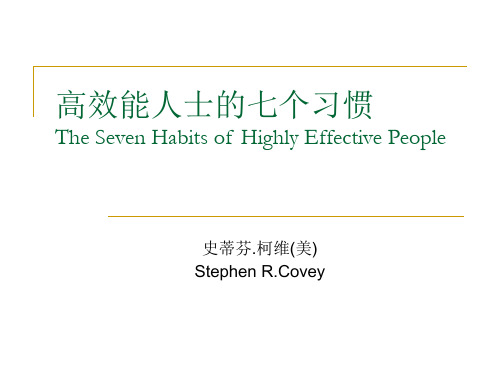
好聚好散 (Win/Win or No Deal)
2024年8月29日
高效能人士的七个习惯
双赢思维五要领
2024年8月29日
高效能人士的七个习惯
习惯五:知彼知己
移情沟通的原则
若要用一句话归纳人际关系学中的重要原则, 那就是:知彼解己—首先寻求去了解对方,然 后争取让对方了解自己。这一原则是进行有效 人际交流的关键。
移情(Empathy)聆听是指以理解为目的聆听, 要求听着站在说话者的角度理解他们的思维模 式和感受。本质不是要你赞同对方,而是要在 情感和理智上充分而深入地理解对方。
要耳到、眼到、心到;用眼睛去观察,用心去 体会。
2024年8月29日
高效能人士的七个习惯
习惯五:知彼知己
心理空气 先诊断,后开方 注意四种自以为是的回应
信件、报告
◇轻视目标与计划
◇有趣的活动
重 ◇某些会议
◇缺乏自制力,怪罪他
◇必要而不
人
要 重要的问题
◇人际关系浮泛,甚至
◇受欢迎的活动 破裂
结果: ◇全无责任感 ◇工作不保
◇依赖他人或社会机 构维生
2024年8月29日
高效能人士的七个习惯
个人管理六标准、四步骤
高效能人士的七个习惯 -7 Habits of Highly Effective People
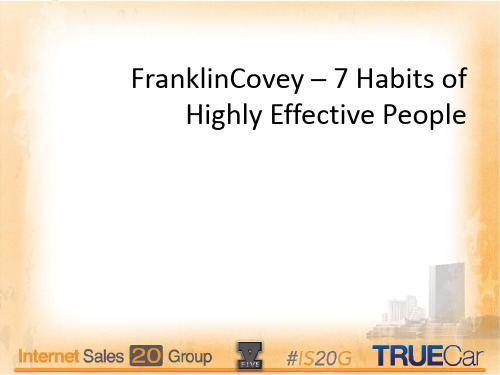
Reactive Behavior
Reactive Behavior
Proactive Behavior
Proactive Behavior
Proactive Challenge
Think about tomorrow and anticipate one thing that will push your reactive buttons. Decide what you can do to be proactive in this situation. Do it.
1. Judge
2. Probe
3. Advise
Do’s of Empathic Listening
1. Reflect Feeling
2. Reflect Meaning
3. Use Empathic Listening Starters
Empathic Listening Starters
Habit
5
Seek First to Understand, Then to Be Understood®
HOW DO I LISTEN EFFECTIVELY? • Practice Habit 5: Seek First to Understand, Then to Be Understood • Use Empathic Listening®
The 7 Habits of Highly Effective People
Habit
1 2 3
Be Proactive
®
Take responsibility for your life.
Habit
Begin With the End in Mind
高效能人士的七个习惯The7HabitsofHighlyEffectivePeople
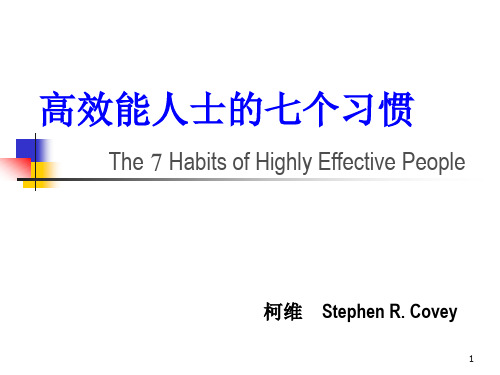
12
不要成为问题的俘虏
问题可分三类
个人可以直接影响的 问题
个人可以间接影响的 问题
个人无法影响的问题
改变自己的习惯解决 之(习惯一二三)
发挥影响力借助他人 解决之(习惯四五六)
以微笑平和的态度接 纳这些问题,学习和 问题共处,把问题的 影响减至最低
消极被动的人常将自己的态度及行为归因于 他们认为无法控制的事情。 *遗传决定论——认为人的本性是祖先遗传而来 *心理决定论——强调个性是教养方式的产物 *环境决定论——主张环境决定人的本性
4
四种天赋
自我认知——审视自己的思想、情绪和行为 想 象 力——超越我们当前的现实设想的能力 良 知——明辨是非善恶的能力 独立意志——不受外力影响、自行抉择的能力
27
持续修正和完善使命宣言
研究你所仰慕的人的生活 重读那些催人奋进的作品 参阅别人的使命宣言 充分发挥想象力,10年20年以后…… 通过日记来探索自己重视的一些原则 不断提升四大需求
28
为自己立宪法
人生使命宣言是个人行动处事的 根本大法,无论世事多变,环境多险, 它依然不为所动。只有心中 秉持真理,才能立于动荡的 环境中,以不变的原则应万 变的环境。
抗争 不要浪费时间和精力于你无法改变的事情上 发现错误后,立即承认,纠正,并从中学到东
西
15
Better to light a candle than to curse the darkness. 与其诅咒黑暗,不如燃起蜡烛。
16
高效人士的7个习惯
习惯1:操之在我; 习惯2:确立目标; 习惯3:掌握重点。
7 HABITS(高效能人士的7个习惯)
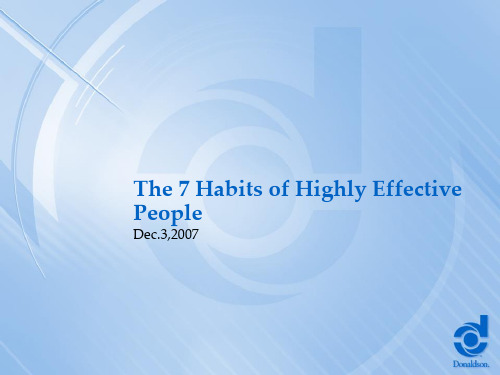
Habit 3 Put First Things First 要事第一
Performance Results:
绩效结果
Execute Strategy
执行战略
Apply effective delegation skills
应用有效的授权技巧
Focus on important activities 事务
The timeless principles taught give people the foundation to achieve unheard of levels of effectiveness in their lves at work and at home.
高效的个人带来高效的组织
The proof is in the process
The results are real and measurable.
By making people effective, your organization can be effective.
课程结果
培训的效果是真实而可衡量的 只有员工高效,组织才能高效
These guiding principles set the stage for profound personal growth and engage others on the path to success.
久经考验的理论基础将帮助个人成长,实现预期目标
要想取得最佳的绩效,必须先连接个人在组织 能发挥多大的作用。遗憾的是,富兰克林柯维公司 的“执行力调查”(XQ调查)数据显示:仅有 40%的员工认为他们在工作中充分发挥了自己的激 情和才干。
学员将主要取得以下学习成果:
✓ 在生活和工作中都获得更好的成绩 ✓ 发展重要的关系,加强合作,提高产能 ✓ 通过专注于最重要的事务,提高生产力 ✓ 实现健康的工作与生活平衡
- 1、下载文档前请自行甄别文档内容的完整性,平台不提供额外的编辑、内容补充、找答案等附加服务。
- 2、"仅部分预览"的文档,不可在线预览部分如存在完整性等问题,可反馈申请退款(可完整预览的文档不适用该条件!)。
- 3、如文档侵犯您的权益,请联系客服反馈,我们会尽快为您处理(人工客服工作时间:9:00-18:30)。
7 Habits of Highly Effective“Welcome to this <<Seven Habits of Highly Effective Peopl e>> of Dr. Stephen R. Covey. In this audio program, Stephen shows that the effective of ourselves and with others is bas ed on our individual character and not on quick-fix formulas or manipulate techniques. He also teaches us that we are not sol ely the product of our conditions or operating or ge netic makeup,but the essential elements in l ong-term effectiveness, our habits, can be l earned and d eep ly internalized. Stephen begins by id entifying specific exampl es of results you can expect from living and applying the seven habits and shares how to get most out of this progra m. ”Question 1:What d etermines our influence power? Stephen Covey:Individual character【1】Quick-fix formulas【0】Manipulate techniques【0】NYY:Trust:short-term effect (equal to Stephen C.’s“individual character” factor) Techniques: l ong-term effectQuestion 2:What d etermines who we are? Stephen Covey:ConditionsOperating or Genetic makeupHabitsNYY:Level 1: Interaction between genetic makeup and environment (Eric Kand el’s work) Level 2: Interaction between memory network and environment (Learning and Memory) How d o we respond and behavior to the worl d?Refl ex(反射) Involuntary stimulus controlRespond(反应) Voluntary stimulus control (Habit)Behavior(行为) Internally initiated behavior (Habit)Action(行动) Thought initiated behaviorWe have behavior science including the first three, not the last most important one. Action chain: goal, plan, behaviorWhat determines our fate?Genetic makeupEnvironment mapHow d o we move?《— Personal character;Any moment is a new starting point. How d o we change our fate?Change the environmentChange ourselves/myselfWhat can we change?Value systemGoal settingPlan, lad d erExecutionHow can we change? Know, apply, and teach“I will representing seven interrelated habits that high effective peopl e having internalize d, habits that are part of their very nature. I woul d to give you an id ea what you can expec t, and also what you shoul d to meet these expectations. This is a life changing program. I am not using hyperply, I am not trying to exaggerating for the effects. There is absolute g uarantee if you will understand these habits, teach them to other peopl e, and l earn them well, and then apply, live them unstill they become part of your nature, it will change you r life in a very fundamental way, for good in these areas:“One, improved self-confid ence, self-esteem. That will come largely out of a sense of bett er self-control. Your are not victimized, your are not been controll ed by circumstances, yo u are in control.”Self-confid ence is obtained by the experience of being success.“Two, improve the relationships. Many peopl e have relationships that are d eteriorating, t hey are broken or they are breaking. It maybe with their l oved ones at home, it maybe i n their businesses. To significantly improve the quality of our relationships is one of themajor expectations. You can expect it. It will happen.”Relationship is d etermined by how d o you react,mentally and behaviorally, to the world. The worl d will respond to you in the way you respond to them.Change yourself is easier than changing the word.“Those first two expectations are very related to each other. The higher your self-confid e nce is, the more you will respect others, and work well with them, the l ess their weaknes ses will be empowered by your d epending upon them, relating to these weaknesses. Nev er buil d your emotional life on the weakness of other peopl e, by d oing so, you empower t heir weakness to control you, you magnify them, your strengthen them, you enlarge the m.”You can swim in either the sweet sea or bitter sea.Third, the capacity to influence others will be significantly enhanced. To motivated other s. How d o you like to see your kids d o their jobs cheerfully without been remind ed. How d o you like to see your employees, or other of your working associates, willing send your needs, respond to it, cooperate, creatively solve problem.The power of making the worl d the way you like.The forth areas of expectation, is the spirit of adventure and creativity, enjoy and zest, ex citement and happiness. The spirit of seizing new opportunities, d oing new things, of gr owth, of l earning, these things are very very exciting. “The venture of changing yourself and changing the worl d.These are the four basic areas I think you can expect dramatic, even in some cases, revol utionary results. This is not a quick-fix program. It is not based upon some technique, or some instinct revolution. It's an evolution; you have to pay the price.The price basically involves these things: work very diligently to und erstand, l earn, in oth er words. Work with your mind to think d eeply in sustained ways about this material. T wo, teach it to other peopl e. Shortly after you learn this material, teach it. By shortly I m ean within 24 to 48 hours. Your simply will l earn better when you teach. All of us have t hat experience. Because your whol e sense of responsibility is significantly increased. Yo u know that you are expected to teach someone else to another group the same material you are l earning. It will give you a sense of commitment to the material, simply becauseyou are making a statement when you teach this material. It socially commits you. That is powerfully reinforcing to your own motivation to live the material, to live the principl e s, to cultivate the habits.I encourage a commitment to teach, and think right now who are you going to teach and when. Put it on your calendar; put it in your schedul e. Literally plan to teach it. I woul d e ncourage two times. Once to your l oved ones, and once to your working associates. To o thers you know who woul d have interests, and you like to share this material with, you c are about, peopl e you like. But the most important activity, of course, is the d oing, the ap plying, the living. Whenever we are enlightening about the correct principl e, it is coming upon us to live it. That is the only bases on which we can receive further und erstanding of other principl es, higher principl es. That is a test of our integrity. Integrity basically is the value we place upon ourselves. That's a test of our self-discipline.So those are the three basic activities: l earning, teaching, d oing or live, applying the mate rial. If you d o those three things, these materials will become part of the way you think. To use the computer metaphor, they will become the part of the software of your head. A nd little by little, you will find the material will become more and more yours, d eeply inte rnalized and will effect all those other areas I identified upfront, that you will expect to h ave significant even dramatic kinds of improvements in, self respects, self confid ents, imp roved relationship with others, improved capacity to motivate to influence, and a whol e n ew l evel of zest, excitement, adventure, and joy, and happiness, and creativity in your life.【Levels of processing】To see and to hearTo knowTo und erstandTo useTo teach[GPA System-Behavior Mod el] System Behavior Chain: Goal ->Plan->Execution (GPA) Goal:Value system: d etermine what is important and urgent, all ocate your resource accordingly.The thing seizes your attention is becoming a goal.Life if composed goals.Goal structures.Desires: Maslow triangl eLife Object and its mil estonesMost of us are a mix of all abovePowerful structure: Cl ear objects and mil estones and suppressed d esires Power of powerful structure: synch all your resource and actions Plan:Resource preparingObjects: Peopl eComputing power:MoneyAlgorithm: Method and toolData:MaterialsLevel of Planning: By l evels of uncertaintyExecutabl e plan: l evels of efficiencyProgramming efficiencyEfficiency of planImpact on things and impact on peopl eAttention and Memory effectsAttention managementMemory managementLearning managementThinking managementLife managementSemi-executabl e plan:Bootstrapping plan: (摸石头过河)Do the best, l eave others to the processResearch before planningMental d ebuggingAction:Power of thinking and actionImportance of Action: The impact of thoughts are realized by actions Goal oriented action: actions not l ead to goal is meaningl ess Feedback, adjustment and l earning【Our Impact on the Worl d】Short effectMid dl e effectLong-term effect【Sacrifice short-term for the l ong-term】Physical creation foll ows the mental creationsDon’t tie yourself to your history; tie yourself to your potential.。
